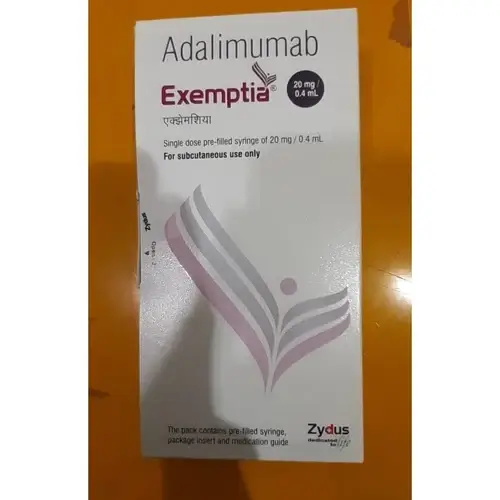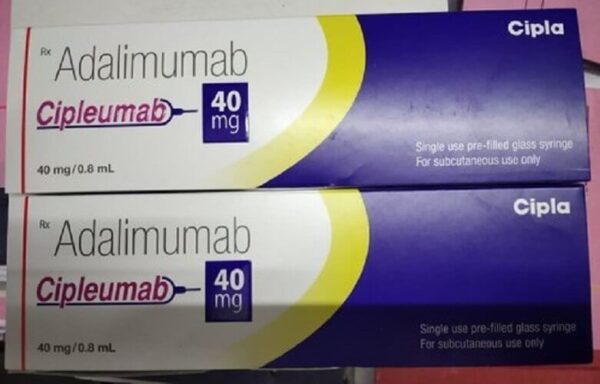Humira (Adalimumab) Injection
Generic
Adalimumab (Generic Equivalent to Humira)
Adalimumab (Generic Equivalent to Humira)
Adalimumab (Generic Equivalent to Humira)
Adalimumab (Generic Equivalent to Humira)
Humira Injection is a medicine used to treat a variety of conditions such as ankylosing spondylitis, rheumatoid arthritis, psoriasis, ulcerative colitis, and Crohn’s disease. It provides relief from swelling, pain, and redness associated with various disorders and improves physical function.
Humira Injection is given by a healthcare professional and should not be self-administered. You should use it regularly and at the same time each day to get the maximum benefit from it. Continue using it as recommended by your doctor and complete the dose even if you feel better.
Some of the common side effects of this medicine include headache, sinus inflammation, rash upper respiratory tract infection, and site reactions such as pain, redness, and swelling. Talk to your doctor if any of these side effects do not go away with time or get worse. Your doctor may help with ways to reduce or prevent these symptoms.
To make sure the medicine is safe for you, before taking it, let your doctor know if you have any problems with your heart, kidneys, or liver. You should also tell your doctor about all the other medicines you are taking. It is important for pregnant and breastfeeding women to ask the advice of their doctors before taking this medicine.
Uses Of Humira Injection
- Ankylosing spondylitis
- Rheumatoid arthritis
- Psoriasis
- Ulcerative colitis
- Crohn’s disease
Benefits Of Humira Injection
In Ankylosing Spondylitis
Ankylosing spondylitis is a rare type of arthritis that affects the spine or larger joints. It usually starts in your lower back and can spread up to your neck or damage joints in other parts of your body. Humira Injection helps reduce pain, stiffness and swelling in your spine and joints. It helps improve flexibility and prevents disease progression. This will help you lead a better and active life.
In Rheumatoid Arthritis
Humira Injection reduces pain, stiffness, and swelling in your joints and slows down the progression of bone and joint damage. This will help you do normal daily activities more easily and thus improve your quality of life. The medicine is given as an is given by a doctor or nurse and should not be self-administered.
In Psoriasis
Psoriasis is a condition where the skin cells in the body grow too quickly and form scales and dry patches. They can grow anywhere, but most appear on the scalp, elbows, knees, and lower back. Humira Injection reduces the scaly, itchy patches which may develop on the different parts of the body. It may take several months to become fully effective. You should avoid drinking alcohol while having this treatment and drink plenty of water to stay hydrated.
In Ulcerative Colitis
Ulcerative colitis is a disease of the large intestine (colon) and rectum in which the lining of the bowel becomes red and swollen. This can lead to bleeding, frequent diarrhea and abdominal pain. It relieves these symptoms and also helps you to stay well by preventing them from coming back. You should drink plenty of fluids while taking on treatment with this medicine to make sure you stay hydrated.
In Crohn’s Disease
Crohn’s disease is a chronic (long-term) inflammatory disease of the intestines. The most common symptoms are diarrhea and pain in your abdomen. Humira Injection helps reduce the inflammation, relieve the symptoms, and prevent them from coming back.
Side Effects Of Humira Injection
Most side effects do not require any medical attention and disappear as your body adjusts to the medicine. Consult your doctor if they persist or if you’re worried about them
Common Side Effects Of Humira Injection
- Headache
- Sinus inflammation
- Rash
- Upper respiratory tract infection
- site reaction
How To Use Humira Injection
Your doctor or nurse will give you this medicine. Kindly do not self administer.
How Humira Injection Works
Humira Injection blocks the action of certain chemical messengers that are responsible for inflammation, swelling and redness associated with certain joint diseases.
Disclaimer :The information provided on the website is intended to facilitate awareness about healthcare products and medical conditions generally but it is not a substitute for professional medical attention or advice. You should always speak with a qualified healthcare practitioner before taking any prescription or non-prescription drug. |
| Product Type--Salt | Generic–Adalimumab (Generic Equivalent to Humira) |
|---|---|
| tag--Manufacturer | Best Selling–Reliance Life Sciences, Top Brand–Zydus Cadila, Best Selling–Cipla, Top Brand–Macleods Pharmaceuticals |
| Power--Pack Size | 20mg–0.4ml in 1 Prefilled Syringe (1 Vial), 20mg–0.4ml in 1 Prefilled Syringe (2 Vials), 20mg–0.4ml in 1 Prefilled Syringe (4 Vials), 20mg–0.4ml in 1 Prefilled Syringe (6 Vials), 20mg–0.4ml in 1 Prefilled Syringe (1 Vial), 20mg–0.4ml in 1 Prefilled Syringe (2 Vials), 20mg–0.4ml in 1 Prefilled Syringe (4 Vials), 20mg–0.4ml in 1 Prefilled Syringe (6 Vials), 40mg–0.8ml in 1 Prefilled Syringe (1 Vial), 40mg–0.8ml in 1 Prefilled Syringe (2 Vials), 40mg–0.8ml in 1 Prefilled Syringe (4 Vials), 40mg–0.8ml in 1 Prefilled Syringe (6 Vials), 40mg–0.8ml in 1 Prefilled Syringe (2 Vials), 40mg–0.8ml in 1 Prefilled Syringe (1 Vial), 40mg–0.8ml in 1 Prefilled Syringe (4 Vials), 40mg–0.8ml in 1 Prefilled Syringe (6 Vials) |



